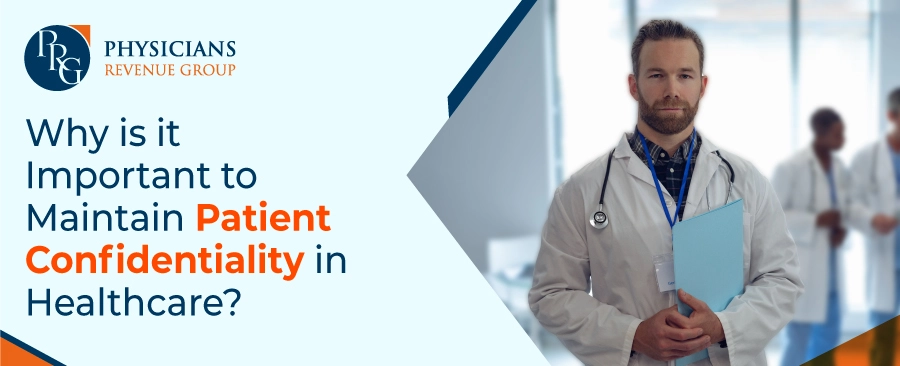
Email: info@prgmd.com | Call: +1 (630) 242-6474
Business hours: 9:00 to 5:00 | Monday to Friday
Email: info@prgmd.com | Call: +1 (630) 242-6474
Business hours: 9:00 to 5:00 | Monday to Friday

Table of Contents
ToggleA patient’s individually identifiable health information and data is one of the most sensitive types of personal information. Furthermore, the healthcare industry is one of the most targeted areas for criminal and malicious attacks on patient medical data. System faults and human errors can cause breaches of patient confidentiality in healthcare. Your team of medical professionals and healthcare providers must know how to protect a patient’s confidentiality. Furthermore, your staff and medical billing services providers must protect health information and implement cybersecurity measures to protect electronic health records from cybercrime and online threats.
Patient Confidentiality in healthcare is important, not just legally but for trust, quality care, and a doctor’s reputation. Imagine sharing personal details, expecting confidentiality, and then having that trust broken. This breach leads to hurt, betrayal, and embarrassment, damaging the relationship.
Now, picture a doctor violating your trust by disclosing your diagnosis without permission. This escalates emotions—anger, hurt, confusion. You might switch doctors or avoid medical care, potentially risking your well-being. Maintaining patient confidentiality in healthcare is key—it safeguards trust, ensures optimal care, and is a legal requirement. A patient’s healthcare information is inviolable; no one can share it without explicit consent. This trust gives the foundation of a solid doctor-patient relationship. Doctors rely on complete information for informed decisions.
Let’s explore the legal side of patient confidentiality in healthcare. But first, we must answer the key question here:
Is Billing Information Protected Under HIPAA?
Patient confidentiality is not only a moral code; it’s a legal must for all healthcare professionals. In the U.S., HIPAA compliance in medical billing is the guardian of patient privacy.
Under HIPAA, patient health records remain sealed unless provided with written consent. It shields patient health details from prying employers, giving patients authority over their health information.
Understanding these legal aspects empowers all stakeholders—knowing that all health details are protected and are under the patient’s control. Patient confidentiality in healthcare is not just ethical; it’s the law, ensuring patient health information remains private.
In healthcare, patient confidentiality is essential. The code of conduct emphasizes that doctors and staff must keep patient information confidential, except when required by law or public interest. However, there are instances where healthcare professionals must deviate from this duty.
For instance, they must disclose information in birth or death notifications. Additionally, suspicions of child sexual abuse and specific circumstances requiring notification to the coroner also exempt them. Doctors may collect blood samples for motor vehicle accident injuries, and health workers need blood test results for needlestick injuries. Notification is mandatory for positive test results of diseases like HIV/AIDS, cholera, and smallpox.
Understanding these exemptions is vital for healthcare professionals and administrative staff. It ensures compliance with the law while highlighting the delicate balance between patient confidentiality and public interest.
To maintain patient confidentiality in healthcare, providers must follow best practices for safeguarding data. This involves securely managing electronic health records and paper documents and appropriately disposing of information.
Following these practices helps healthcare organizations reduce the risk of data breaches, ensuring the confidentiality of patient details. Implementing secure data management practices helps in maintaining trust and safeguarding sensitive healthcare information.
Providers should employ essential security tools and technologies to safeguard patient confidentiality in healthcare.
– are vital for securing patient information in healthcare. These practices ensure that only authorized personnel can access data, protecting against malicious attacks. Encryption provides a reliable means for authorized individuals to obtain data, while firewalls monitor incoming and outgoing network traffic on healthcare-dedicated networks. Implementing these security measures is key to maintaining the confidentiality of patient information.
Ensuring patient confidentiality in healthcare involves securing electronic health records (EHRs). EHRs are digital versions of patient charts involving vital medical details like:
Safeguarding these records is essential and can be achieved through encrypted technologies and robust access controls. Unauthorized access must be prevented, highlighting the importance of strong security measures for maintaining patient confidentiality in healthcare.
Healthcare providers must establish protocols to safeguard patient confidentiality and respond efficiently to data breaches. This plan enables organizations to minimize the impact on patients’ information.
Incident response plans should include:
-all of this when facing unauthorized access or security incidents. The protection of confidential medical details is vital for delivering quality healthcare.
Satisfying notification requirements helps ensure affected individuals’ data security post-breach. Following the relevant laws is essential in the United States. This includes notifying affected individuals and government bodies if potential harm from inappropriate exposure exists. By doing so, healthcare professionals enable patients to take preventive steps against the misuse or loss of their information in any incident involving their private details. Ensuring compliance with notification protocols is vital to upholding trust and patient confidentiality in healthcare services.
Efficient response to data breaches involves a well-defined plan, thorough investigation, and following notification requirements. Prioritizing patient confidentiality is one of the basics for maintaining the trust and security of individuals seeking healthcare services.
Ensuring patient confidentiality in healthcare helps deliver quality care in the digital age. Healthcare providers need a deep understanding of its importance. First, comprehending legal regulations and secure handling of medical data is essential. Second, informing patients about their privacy rights through informed consent processes is equally important. Addressing human error or malicious insider threats adds an extra layer of security.
Moreover, working with third-party services and managing potential breaches are essential to safeguarding patient information. These actions comply with regulations and maintain trust between doctors/providers and patients. Ultimately, this promotes positive care outcomes in healthcare delivery.
Share:
Categories
Recently Added

What is an ABN in medical billing?

What does a Clearinghouse do During Claims Submission?

What is EOR in Medical Billing?
We Would Love to Assist You!
We treat your data confidentially and don’t share any information with a third party.